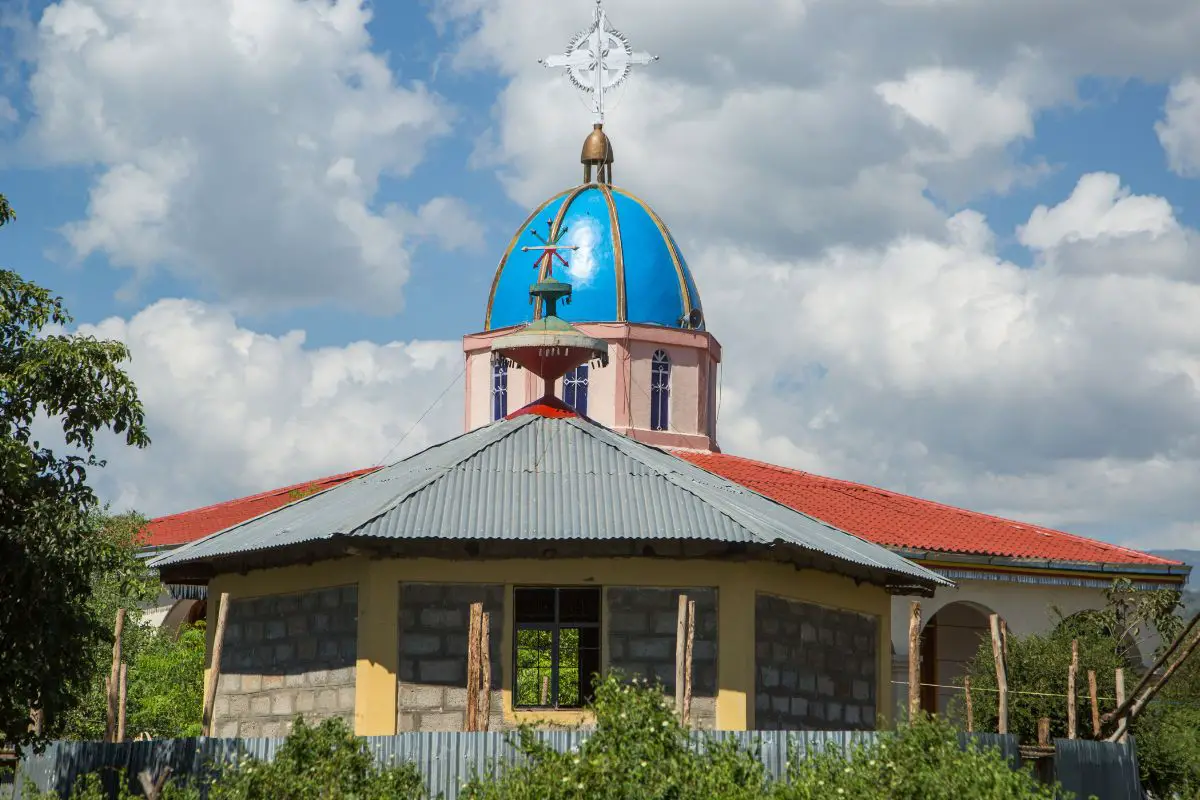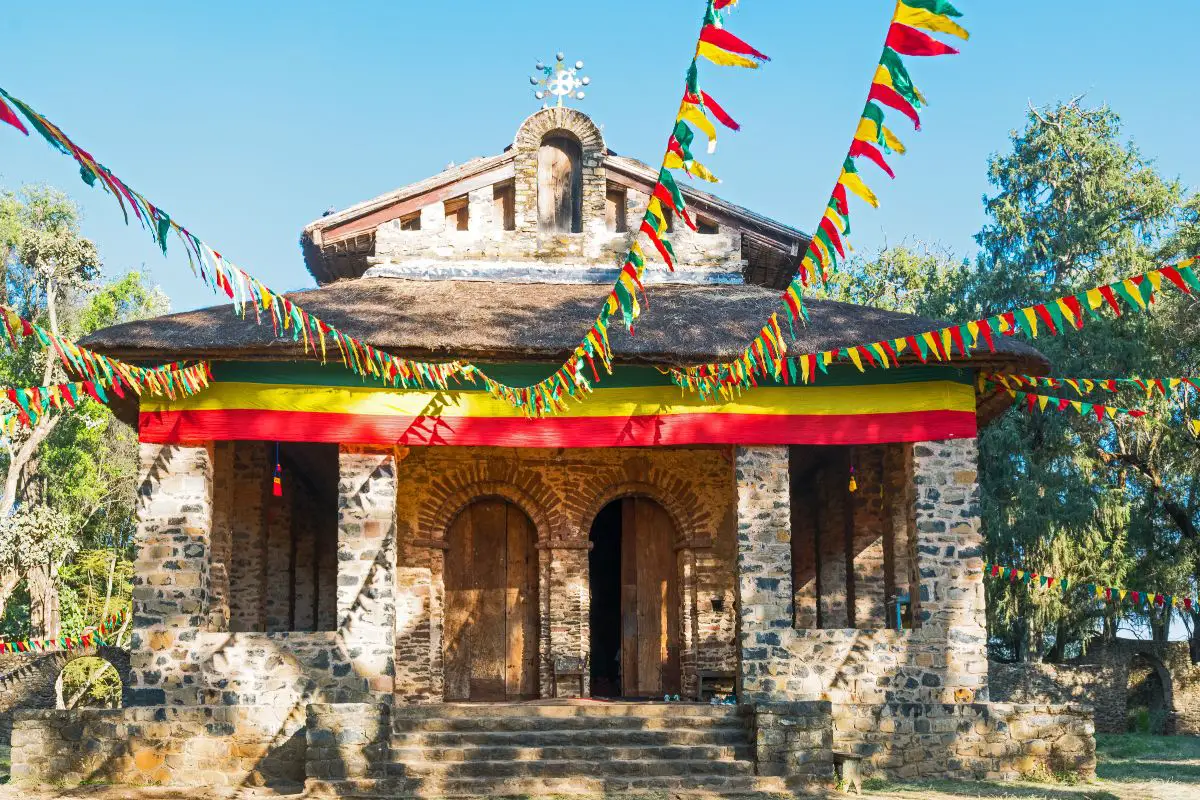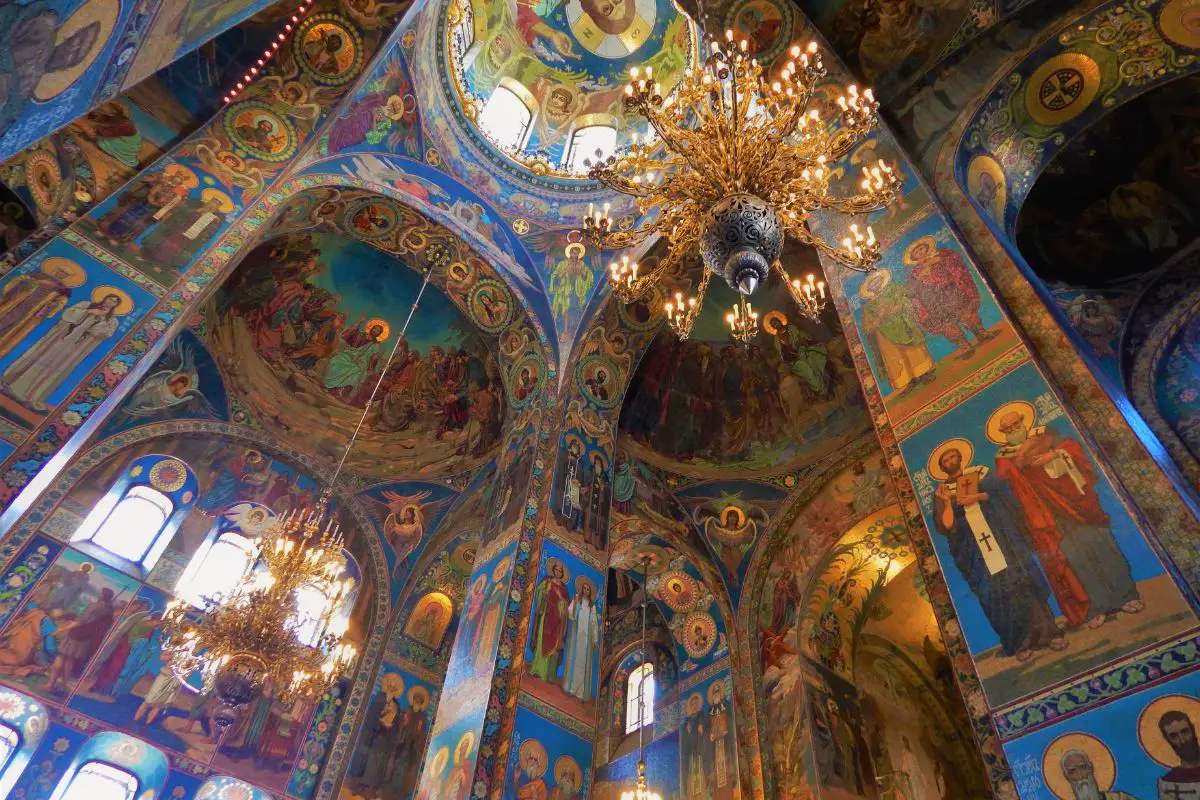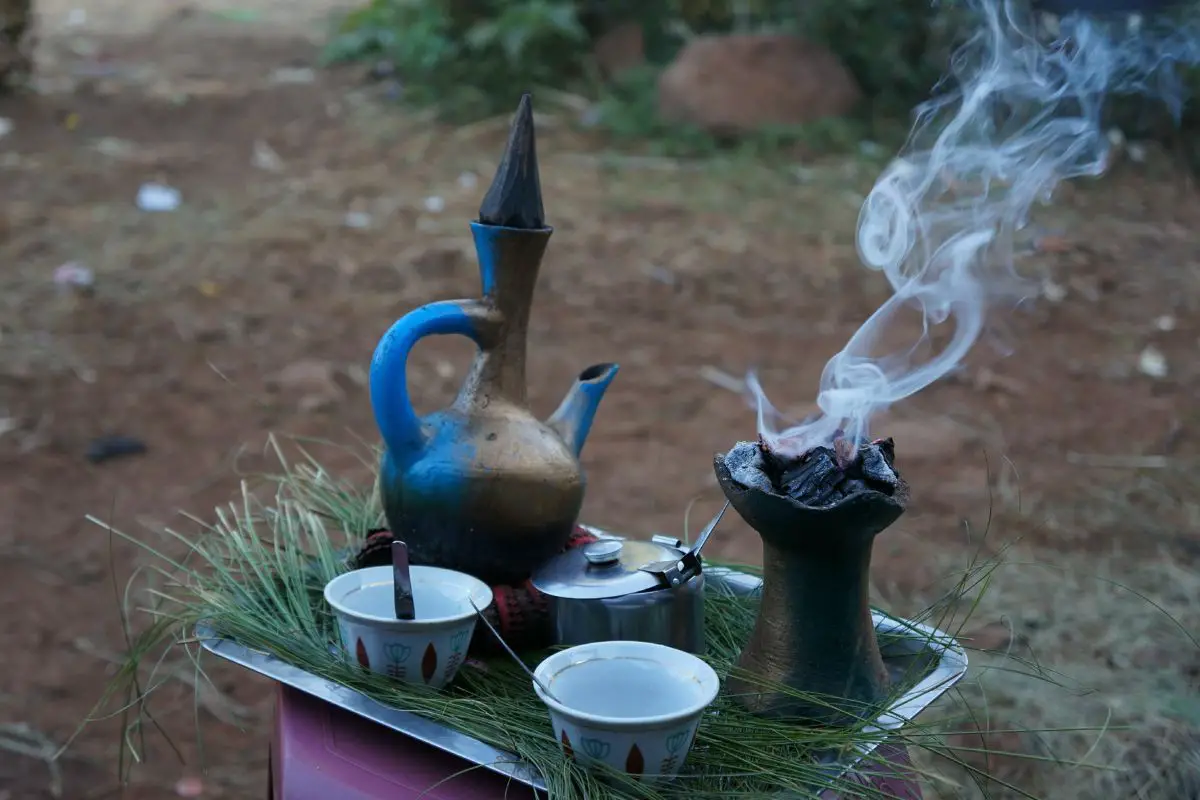Dive into the rich history and cultural significance of coffee in Ethiopia, as we explore its origins, its journey around the world, and its deep connection to the Ethiopian Orthodox Church. Discover the traditional Ethiopian coffee ceremony and how it has become an integral part of the religious rituals and practices within the Ethiopian Orthodox Church. Learn about the various feasts, celebrations, and even mourning rituals that involve coffee, as well as its symbolism and meaning in these spiritual moments. Furthermore, gain a comparative perspective on the role of coffee in other religious traditions, including Islam and various Christian denominations.

Historical Background of Coffee in Ethiopia
Origins of coffee in Ethiopia
The birthplace of coffee, Ethiopia has a long and rich history that is deeply intertwined with the flavorful bean. According to legend, the origins of coffee can be traced back to the Ethiopian region of Kaffa, where a young goat herder named Kaldi first discovered the stimulating effects of the plant in the 9th century. Kaldi noticed that his goats would become energetic and restless after consuming the red berries from a particular tree, and he decided to try them himself. Upon experiencing similar effects, he shared the beans with a local monk who then spread the knowledge of the coffee fruit to nearby monasteries.
The truth behind Kaldi’s story remains uncertain, but even without that tale, Ethiopia has a strong claim to being the birthplace of coffee. Genetic testing of coffee plants supports the idea that Coffea arabica, the most widely planted species of coffee, originated in the region. It is in Ethiopia where the wild coffee forests can still be found, preserving the vast genetic diversity that has allowed coffee to thrive worldwide.
Ethiopians have used coffee for centuries as an energizing substance and social beverage, which likely predates the arrival of the Arab world. They would initially consume the beans by grinding them and mixing them in with animal fat, creating a nutritious and portable energy source. Later, they devised a way to steep the coffee grounds in water, starting the tradition of coffee consumption as we know it today.
Spread of coffee around the world from Ethiopia
The spread of coffee from Ethiopia to the rest of the world began primarily with its introduction to the Arabian Peninsula in the 15th century. Yemeni merchants and traders brought coffee beans to Yemen, where cultivation of the plant took root. As Islam spread through the region, so did coffee, eventually reaching the Ottoman Empire, Egypt, and North Africa.
Mecca and Medina, the two holiest cities in Islam, became centers for coffee trade and consumption. Coffee houses materialized as places for social and intellectual gatherings, with patrons discussing religious, political, and cultural issues over cups of coffee. These establishments would later be dubbed qahveh khaneh, or “houses of coffee.”
As global trade networks expanded, coffee was introduced to Europe and Asia, becoming a popular commodity. Venetian merchants were among the first Europeans to encounter coffee, and they in turn introduced it to the European continent in the 17th century.
The Dutch, French, and British actively spread the cultivation of coffee to their colonies in the Americas and Asia, solidifying its place as a global commodity. Today, coffee is grown in over 70 countries, and it remains a significant cultural and economic force in Ethiopia, where it is the country’s most important cash crop.
Traditional Ethiopian coffee ceremony
The coffee ceremony plays an integral role in Ethiopian culture and society, emphasizing the social value and community bonds created through the consumption of coffee. The traditional Ethiopian coffee ceremony involves several distinct stages, showcasing the care and attention that goes into preparing the beverage.
First, the green coffee beans are washed and then roasted over an open flame. The coffee roaster, usually a woman, shakes the roasting pan back and forth, ensuring an even roast. The aroma produced by the roasting beans is shared with the guests, as an invitation to the ceremony.
Next, the roasted beans are ground using a mortar and pestle, producing a fine powder. The coffee grounds are placed into a traditional clay pot called a jebena, which is filled with hot water. As the coffee brews, the host prepares small cups, often adorned with traditional patterns and designs, and arranges them on a tray.
Once the coffee is brewed, the host pours it into each cup without interrupting the stream, a skillful process that often leaves guests in awe. Traditionally, guests will consume three rounds of coffee, each representing a unique blessing or stage in the ceremony.
Apart from the beautifully crafted ceramics and traditional clothing worn by the host, the ceremony is also marked by its rich aromas and flavors, showcasing the diverse and vibrant coffee culture of Ethiopia. The ritual continues to bring people together, fostering a sense of community and connection that dates back to the very origins of coffee itself.
Ethiopian Orthodox Church: Beliefs and Practices

Overview of the Ethiopian Orthodox Church
The Ethiopian Orthodox Church, also known as the Ethiopian Orthodox Tewahedo Church, is one of the oldest Christian denominations in the world. It traces its origins to the first century when the apostle Philip baptized an Ethiopian royal official, as described in the Acts of the Apostles (Acts 8:26-40). The Ethiopian Orthodox Church was officially established in the 4th century by Syrian monks who brought Christianity to the region.
The Ethiopian Orthodox Church has a rich cultural and spiritual heritage, with unique beliefs and practices that set it apart from other Orthodox Christian traditions. Its doctrine is based on the Bible, the Nicene Creed, and the teachings of the early church fathers. Some of the distinguishing features of the Ethiopian Orthodox Church include its belief in the “Miaphysite” doctrine of Christ’s nature, its use of the ancient Ge’ez language in liturgy, and its adherence to the Ethiopian Orthodox calendar.
One of the most distinctive aspects of the Ethiopian Orthodox Church is the use of the Tabot, a replica of the Ark of the Covenant, which is believed to be kept in every church sanctuary. The Ethiopian Orthodox Church also has a strong emphasis on monasticism, with a vast network of monasteries throughout the country. These monasteries are essential centers of learning and spiritual development within the church.
Role of rituals in the Ethiopian Orthodox Church
The Ethiopian Orthodox Church has a rich tradition of rituals and ceremonies that play a central role in the religious practices of its members. One of the most prominent rituals is the Divine Liturgy, known as the Kidase, which is celebrated daily in communal worship. It includes prayers, hymns, and the reading of the Scriptures in the ancient Ge’ez language. The celebration of the Eucharist is the central focus of the Kidase, and the Christian faithful partake in Holy Communion as a means of spiritual nourishment and unity with Christ.
Another important ritual in the Ethiopian Orthodox Church is the observance of the sacraments, including baptism, confirmation, the Eucharist, penance, marriage, priesthood, and the anointing of the sick. These sacraments are essential means through which believers receive the grace of God and grow in their spiritual journey.
The Ethiopian Orthodox Church also observes a unique calendar that includes numerous feast days and fasting periods throughout the year. The major feasts include Christmas, Epiphany, Easter, and the Feast of the Ascension. Many of these celebrations are marked with special rituals, including processions, prayers, and the singing of hymns.
Fasting and food traditions in the Ethiopian Orthodox Church
Fasting is a significant practice in the Ethiopian Orthodox Church, with more than half the year dedicated to fasting. There are various fasting periods throughout the year, including the Great Lenten Fast, which consists of the 56 days before Easter, and the Advent Fast, which lasts 40 days before Christmas.
During fasting periods, Ethiopian Orthodox Christians abstain from consuming animal products, including meat, dairy, and eggs. This practice is rooted in the belief that fasting helps believers cleanse their bodies and minds, allowing them to become closer to God. Fasting is also seen as an act of self-discipline and solidarity with the poor and suffering.
Ethiopian Orthodox Christians follow a unique diet during fasting periods, relying primarily on plant-based foods such as grains, legumes, and vegetables. The staple food of Ethiopia, injera, is a sourdough flatbread made from teff, a small grain native to the region. Another common Ethiopian dish served during fasting is shiro, a thick stew made from chickpea or lentil flour and spices. Traditional Ethiopian cuisine is known for its rich flavors and use of various spices, including berbere and mitmita, which are unique to the region.
The food traditions of the Ethiopian Orthodox Church reflect the deep spiritual and cultural heritage of its followers. By engaging in these practices, Ethiopian Orthodox Christians express their faith and commitment to God while also preserving their rich cultural identity.
Role of Coffee in Ethiopian Orthodox Church Rituals
The Ethiopian Orthodox Church is one of the oldest Christian traditions in the world, with a rich history and unique rituals that set it apart from other forms of Christianity. Coffee, which originated in Ethiopia, plays an essential role in the religious and cultural life of the Ethiopian Orthodox Church. This article will explore the significance of coffee in Ethiopian Orthodox Christianity, its symbolism, and how it is prepared and consumed during religious rituals.
Coffee as a sacred plant in Ethiopian Orthodox Christianity
Ethiopian Orthodox Christians regard coffee as a sacred plant, believed to have been discovered by a goat herder named Kaldi around the 9th century. According to legend, Kaldi noticed that his goats exhibited elevated energy and excitement after eating the leaves and berries of a particular plant. He took the coffee beans to a local monastery, where the monks recognized their stimulating effect and incorporated them into their religious practices.
The Ethiopian Orthodox Church considers coffee to be a divine gift with a strong connection to the spiritual realm. The reverence for coffee ensures it plays a crucial role in various religious ceremonies and rituals. It is used to symbolize unity, hospitality, and spiritual nourishment, and the Ethiopian Orthodox view the preparation and consumption of coffee as a way to connect with God.
Meaning and symbolism of coffee in Ethiopian Orthodox rituals
In Ethiopian Orthodox Christianity, coffee holds a prominent position with deep spiritual meaning and symbolism. It is used to reflect the essential elements of the faith and to affirm the bonds that connect believers.
One of the central symbols of coffee in Ethiopian Orthodox rituals is that of unity, as the communal act of drinking coffee brings people together. This unity is closely associated with the Ethiopian concept of “negus,” which implies kinship and collective identity. When people gather to pray, meditate, or worship, sharing coffee is an expression of shared faith and community.
Coffee is also a symbol of hospitality in the Ethiopian Orthodox Church, as offering coffee to guests is an essential element of Ethiopian Christian culture—serving as an act of respect, friendship, and acceptance. The elaborate coffee ceremony performed during religious observances offers an opportunity for people to connect with one another, share their experiences, and strengthen their relationships with fellow believers.
Moreover, coffee is seen as a source of spiritual nourishment, enhancing mental clarity and focus during religious services and prayer sessions. It is believed to extend its energizing properties to the soul and reconnect the faithful with God.
How coffee is prepared and consumed during rituals
The Ethiopian Orthodox coffee ceremony portrays a highly ritualized process that underscores the spiritual significance of coffee in the tradition. It begins with the careful selection of coffee beans and proceeds through various stages, including roasting, grinding, and brewing, culminating in the communal consumption of the final product.
First, green coffee beans are carefully sorted, cleaned, and roasted over open flames until they achieve a rich, dark color. The roasting process is known as “bunna q’orata,” which translates to “the birth of coffee.” Participants often pass around the roasted beans, allowing everyone to appreciate their aroma before moving on to the next stage.
Next, the coffee beans are ground using a mortar and pestle, producing a fine powder. The grinding process, known as “bunna mata,” symbolizes the broken state of humanity and the need for redemption, mirroring essential aspects of the faith.
The coffee powder is then added to a traditional Ethiopian clay pot called a “jebena.” Water is heated and poured into the pot, creating a rich, aromatic brew. The ceremony’s hostess or priest then recites prayers and blessings over the coffee, invoking God’s guidance and protection.
Finally, the coffee is poured into ceremonial cups, traditionally made from carved gourds or clay, and offered to all participants. The coffee is typically served with traditional Ethiopian snacks like popcorn, bread, or “kolo” (roasted barley). Drinking the coffee together symbolizes the unity, hospitality, and spiritual nourishment that the Ethiopian Orthodox Church attributes to this divine beverage.
Specific Ethiopian Orthodox Rituals Involving Coffee

The Ethiopian Orthodox Tewahedo Church, founded in the fourth century, is one of the oldest Christian sects worldwide. Coffee is a vital component of Ethiopian culture, and various rituals and ceremonies in this eastern African nation involve its consumption. This article will outline specific Ethiopian Orthodox rituals involving coffee and discuss their significance in feasts, funerals, and promoting fellowship and spiritual connections.
Feasts and celebrations with coffee
In Ethiopia, coffee is more than just a beverage consumed for its stimulating effects; it is an integral part of social life and a time-honored tradition. One of the most important events where coffee plays a central role is the Ethiopian Coffee Ceremony. This elaborate ritual is performed at various occasions like weddings, births, and Christenings or conducted to honor guests or welcome a new neighbor.
The ceremony begins by roasting green coffee beans over an open flame. As they start to darken, the hostess will use a long-handled pan called a menkeshkesh to mix the beans and fill the room with the aroma. The roasted beans are then ground using a mortar and pestle and brewed in a traditional clay pot called a jebena.
During the ceremony, the hostess serves the coffee in small cups arranged on a round tray. Traditional snacks like popcorn, bread, or roasted barley are offered alongside the coffee. The coffee is consumed in three rounds, which hold spiritual significance. The first round, called Abol, is taken for spiritual blessings, the second round, Tona, is for sharing hearts and dreams, while the final round, Bereka, signifies a moment of appreciating what has been provided.
In addition to the coffee ceremony, coffee is also part of many Ethiopian Orthodox religious feasts such as Timket, Meskel, and Christmas.
Funeral and mourning rituals involving coffee
Coffee plays a significant role in Ethiopian Orthodox funeral and mourning rituals. As per tradition, when a family member passes away, the community gathers at the bereaved family’s house to show their support and help in whatever way they can, including preparing and serving coffee.
The coffee ceremony during this time of mourning is a means of unifying the community and offering a comforting presence. Coffee and traditional snacks are served as people come to pay their respects and share memories of the deceased. The ritual symbolizes sharing the sorrow and grief among the community members, thus uniting the living during this time of loss.
In addition to the initial mourning period, coffee is also often served on the 40th day following a death. This day is considered a time to memorialize the deceased and reflect on the lessons they taught while living. The commemoration culminates in a final coffee ceremony, which brings together family and friends to celebrate the life of the departed.
Coffee as an instrument of fellowship and spiritual connection
The Ethiopian coffee ceremony has deep religious and social symbolism, and it promotes fellowship and spiritual connections among participants. As people gather to consume coffee together, they engage in conversation, share stories, and collectively enjoy the sensory experience of the brewing and drinking process.
Coffee serves as a gateway to communication, enabling community members to forge new friendships, strengthen existing bonds, and exchange ideas. The shared experience of the coffee ceremony also provides a platform for members of the Ethiopian Orthodox Church to discuss matters related to their faith and engage in prayer or meditation.
In Ethiopia, sharing coffee is not only considered an act of hospitality, but also an opportunity for introspection and communal growth. The coffee ceremony transcends the mere consumption of a beverage, acting as a powerful symbol of unity, fellowship, and spirituality integral to Ethiopian Orthodox traditions.
Comparative Perspective: Coffee in Other Religious Traditions
In this article, we will discuss the significance and role of coffee in various religious traditions around the world. Coffee is a widely consumed beverage that is often associated with socializing and rituals, and has found its way into several religious traditions as an important component of certain ceremonies or practices. We will specifically explore the role and significance of coffee in Islamic traditions and Christian denominations other than Ethiopian Orthodox.
Islamic traditions and the role of coffee
The history of coffee dates back to the 15th century, where it was primarily consumed in the Islamic World before it spread to Europe and other continents. The origin of the word “coffee” can be traced back to the Arabic word “Qahwah.” Early Muslims discovered the invigorating effects of coffee after observing its impact on goats, which appeared to become more active and sleepless after consuming the coffee beans.
Coffee soon became known as the “wine of Islam” due to its ability to stimulate the mind without the intoxicating effects of alcohol, which is forbidden in Islam. The stimulating effect of coffee made it popular amongst Sufi mystics, who used the beverage during their late-night devotional practices, as it allowed them to remain alert and awake while they performed their prayers and recitations.
Many Muslims would also gather in coffee houses, known as “qahveh khaneh,” which became centers for socializing, exchanging ideas, and discussing politics and religion. These gatherings helped foster intellectual discussions and the spread of knowledge in the Islamic World.
However, coffee consumption also faced significant opposition within Islamic traditions. Some Islamic scholars argued that, similar to alcohol, the effects of coffee on the body and mind could be considered intoxicating and therefore haram, or forbidden. This led to various attempts at banning coffee during different periods in history, but such restrictions were generally short-lived and unsuccessful.
Overall, while the role of coffee in Islamic traditions has faced some opposition, it has generally been embraced as a popular, non-intoxicating beverage that has played a significant part in fostering a social atmosphere, stimulating intellectual discussions, and maintaining alertness during late-night religious practices.
Coffee in Christian denominations other than Ethiopian Orthodox

In Christian traditions, coffee consumption was initially met with skepticism and suspicion. Early European Christians believed that coffee was an invention of Satan, and it was commonly referred to as the “bitter invention of Satan.” However, this viewpoint changed when Pope Clement VIII tasted coffee in the late 16th century and allegedly declared that “‘We shall cheat Satan by baptizing it [coffee], and making it a truly Christian beverage.”
Coffee soon earned the approval and endorsement of the Catholic Church, and its consumption quickly spread among the Christian community in Europe. Similar to Islamic traditions, the consumption of coffee in Christian communities was seen as separate from the intoxicating effects of alcohol. Socializing at coffee houses became a common practice among Christians, which served as centers for gathering, sharing news, and discussing politics and religion.
In Protestantism, coffee gained popularity during the 18th-century evangelical movement. Leaders like John Wesley, the founder of the Methodist movement, promoted the consumption of coffee as a more temperate alternative to alcohol. This endorsement of coffee led to the establishment of coffee houses by various Christian missionaries, which not only served as places to preach but also provided a social space for their communities.
The role of coffee in Christian traditions other than Ethiopian Orthodox has evolved from early skepticism to a widely accepted beverage, with its consumption often linked to socializing, fostering intellectual discussions, and serving as an alternative to alcohol consumption. It’s also worth noting that coffee has become an essential part of various Christian denominations’ fellowship and hospitality, as coffee is commonly served during church gatherings and social events.
FAQs on The Significance of Coffee in Ethiopian Orthodox Church Rituals
1. Why is coffee important in Ethiopian Orthodox Church rituals?
Coffee plays a significant role in Ethiopian Orthodox Church rituals due to its cultural and historical relevance in Ethiopia. The coffee ceremony promotes social bonding and fosters a sense of community among congregants after the religious services (Selamta, 2019).
2. How is coffee prepared in Ethiopian coffee ceremonies?
During Ethiopian coffee ceremonies, the coffee beans are roasted, ground, and brewed in a traditional clay coffee pot called a jebena. The preparation process is both time-consuming and highly specialized, symbolizing the importance of communal gatherings (Ethiopian Food Guide, 2019).
3. Do men and women have specific roles in Ethiopian coffee ceremonies?
Yes, traditionally, women hold the responsibility of conducting Ethiopian coffee ceremonies by roasting and preparing the coffee. They also serve the coffee to guests, starting with the eldest, in a demonstration of respect and hospitality (Anteneh & Bitton, 2020).
4. Are coffee ceremonies exclusive to Ethiopian Orthodox Church practices?
No, coffee ceremonies are not exclusive to Ethiopian Orthodox Church practices. They extend beyond religious settings and take place in homes, workplaces, and various social events, acting as a vital cultural tradition in Ethiopia (Selamta, 2019).
5. How does the Ethiopian coffee ceremony enhance religious experiences in the Orthodox Church?
The Ethiopian coffee ceremony enhances religious experiences by fostering social interaction, encouraging spiritual discussions, and promoting a sense of unity among worshippers, allowing them to share values and build a cohesive community (Anteneh & Bitton, 2020).
6. What other elements are present in Ethiopian coffee ceremonies within the Orthodox Church?
In addition to coffee, Ethiopian coffee ceremonies within the Orthodox Church may also feature traditional snacks such as popcorn, barley bread, or peanuts, as well as the burning of incense, which fills the room with a fragrant aroma and creates a harmonious atmosphere (Ethiopian Food Guide, 2019).